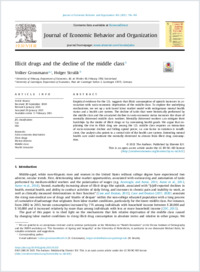Illicit drugs and the decline of the middle class
BP2-STS
- Grossmann, Volker ORCID University of Fribourg
- Strulik, Holger ORCID University of Goettingen
- 2021
Published in:
- Journal of Economic Behavior & Organization. - Elsevier BV. - 2021, vol. 183, p. 718-743
English
Empirical evidence for the U.S. suggests that illicit consumption of opioids increases in association with socio-economic deprivation of the middle-class. To explore the underlying mechanisms, we set up a task-based labor market model with endogenous mental health status and a health care system. The decline of tasks that were historically performed by the middle class and the associated decline in socio-economic status increases the share of mentally distressed middle class workers. Mentally distressed workers can mitigate their hardships by the intake of illicit drugs or by consuming health goods. We argue that explaining the rise in illicit drug use among the U.S. middle class requires an interaction of socio-economic decline and falling opioid prices, i.e. one factor in isolation is insufficient. Our analysis also points to a central role of the health care system. Extending mental health care could motivate the mentally distressed to abstain from illicit drug consumption.
- Faculty
- Faculté des sciences économiques et sociales et du management
- Department
- Département d'économie politique
- Language
-
- English
- Classification
- Economics
- License
- Open access status
- hybrid
- Identifiers
-
- DOI 10.1016/j.jebo.2021.01.021
- ISSN 0167-2681
- Persistent URL
- https://folia.unifr.ch/unifr/documents/322386
Statistics
Document views: 77
File downloads:
- 1-s2.0-s0167268121000342-main: 221
